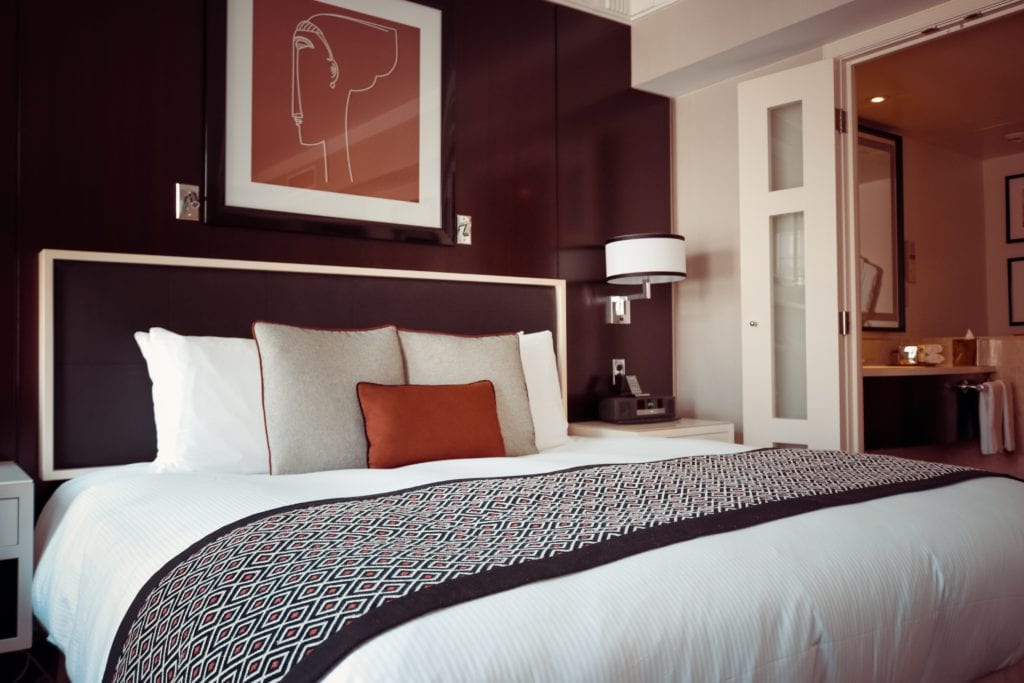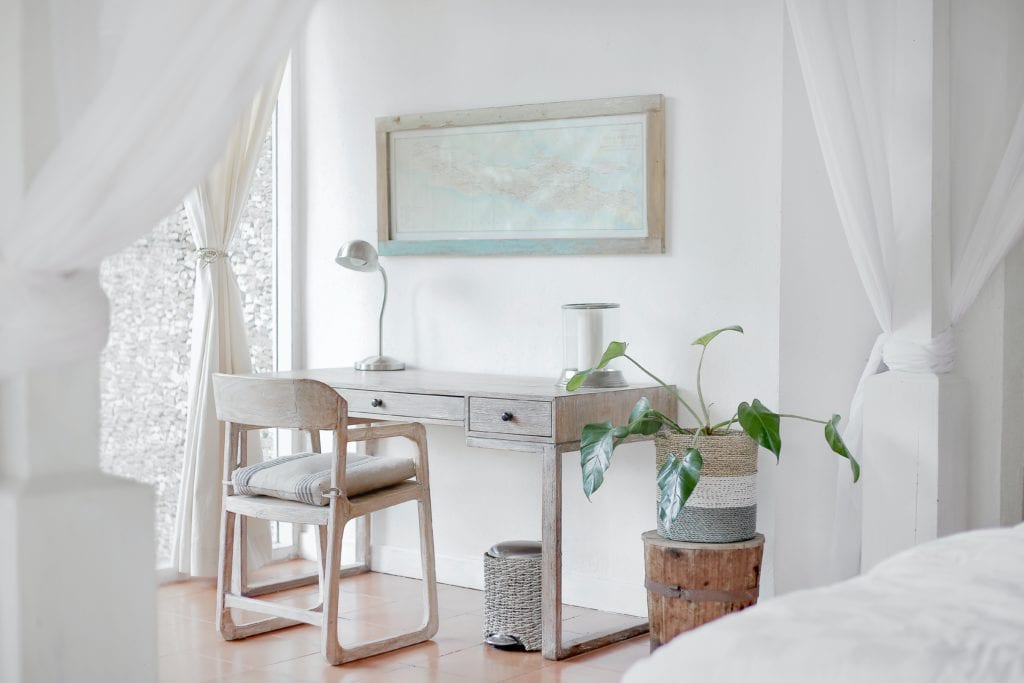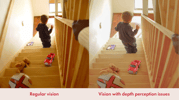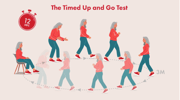
Have you ever tossed and turned trying to get comfortable at night? Or woken up with a bad back? Perhaps you’ve tripped over on your way to pouring a glass of water, or the toilet? Well, you are not alone in your rest-related struggles; ‘sleep tips’ is Googled over 2,400 times a month on average, with searches peaking in January. Many of us feel the uncomfortable repercussions day-to-day too; research shows that nearly four in five people experience back pain specifically in their lifetime.
Our physical environment is crucial for good rest from a supportive bed to surroundings that are obstacle-free for any night-time navigation. Being mindful about this avoids preventable health issues and eases existing ones.
In later life, it’s worth considering factors like accessibility, comfortability and practicality in the bedroom as much as aesthetics. But don’t worry; there’s no need to sacrifice a beautiful bedroom for practicality. Whether you’re worried about your current physical health, tired of feeling tired or wishing to future-proof your home, then follow our top tips.

The many benefits of sleep
A healthy bedtime routine and quality sleep play a crucial role in protecting our physical and mental health. The NHS recommends around eight hours of sleep a day for the average adult. However, this might seem idealistic given broken sleep and day-to-day life commitments, which can throw off our circadian rhythm (which affects our body’s sleep-wake cycle and has an important impact on our immune systems as well as DNA repair).
Regular, good quality sleep is essential for our circadian rhythm. The benefits are endless — from boosting immunity and maintaining a healthy weight with correct chemical balances from a physical perspective, to boosting mood and alertness so we stay mentally well.
What happens if we don’t get enough sleep?
Sleep deprivation is detrimental to our bodies and can be easily overlooked when trying to understand our health. Emotionally speaking, poor sleep can lead to you feeling more anxious, worried, depressed, stressed and consistently finding daily life a harder struggle. These negative feelings may keep you awake at night, triggering a vicious cycle.
Sleep troubles can lead to diminished focus, a short temper and fatigue. These risks escalating into more serious medical conditions including obesity, heart disease, diabetes, and high blood pressure.
Practical tips for quality sleep:
1. Invest in your rest!
Do you often feel like a hotel bed hits the spot when it comes to a great night’s sleep? Why not bring that feeling to your bedroom? Investing in a new mattress or better-quality bedding can be game-changing when it comes to improving your sleep surroundings. It is, of course, your kingdom of rest!
Researching online can feel a daunting task, especially when we can’t currently test out the mattresses in store. However, leading bed brand Opera has it covered with a few, quick questions to help determine your ideal mattress. We suggest taking a look at these future-proof, adjustable beds which offer ultimate comfort, stylish aesthetics and practical ergonomics.
Luxury doesn’t need to be costly, with furniture retailers like Dunelm offering a great range of quality beddings across all price ranges. With a fresh set of sheets, you can never go wrong.

2. Improve the accessibility of your surroundings
Technology has advanced greatly in recent years, and little additions to the bedroom can boost your accessibility. We advise simple lighting solutions such as touch lamps or bedside light switches which help to prevent you from getting up or fumbling in the dark, so you can stay snug — especially on chilly nights. Amazon offers affordable options.
If you are happy to spend a little extra to make a big difference, consider devices like a Google Home. One benefit is the ability to turn off smart appliances and lights at the sound of your voice. Similarly, adjust your home temperature at the touch of a button with Google Nest, all whilst still in bed. Take a look at the Google Home range with all its life-enhancing devices.

3. Tidy room, tidy mind
Turn your bedroom into a sleep sanctuary by ensuring home décor is as minimalist as possible to reduce brain stimulation and excessive clutter.
A little tidying here and there is good for the mind, but constant cleaning shouldn’t dominate your ‘life admin’ list. Check out our space-saving ideas, like extra shelving, to help clear space. It’s a rewarding weekend task with long-term benefits.

Sometimes you must get up in the night and if so, it is important to reduce the risk of tripping. A simple slip can quickly lead to physical ailments which could have been prevented. For some animal lovers, it may be best to not have your pets sleep on the bedroom floor, as this will minimise the risk of hurting yourself as well as your pet! But if you can’t help but snuggle up to your furry friend in bed at night, then ensure all pet accessories out of your night-walking path — perhaps create a dedicated corner instead?

10 ways to wind down after a long day
When it gets close to bedtime, having regular wind-down activities can also improve your chances of falling asleep sooner because your mind recognises these signals to get ready to rest. Here are a few to inspire you:
- Reading
- Journaling
- Listening to a podcast or audiobook — platforms like Audible allow you to set a timer
- Popular sleep apps like Headspace
- A catch-up with your partner
- Enjoy a warm bath or shower to calm your mind and relax your muscles (especially if they are prone to seizing up overnight)
- Grab a delicious hot drink, like herbal tea or Horlicks (preferably caffeine-free as this is a stimulant)
- Colouring in — there are beautiful books for grown-ups at Waterstones
- Needlework like embroidery or knotwork like macrame

Always remember to pour a tall glass of water for your bedside table to save twilight trips to the kitchen sink. Navigating in the dark is risky, while turning on lights to see strains the eyes. The simple act of getting up may mean it’s harder to drift off again.
Make sure when picking these activities that you consider having time away from your phone or tablet, as the blue light can disturb your sleep. The NHS says, “one in 3 of us suffers from poor sleep, with stress, computers and taking work home often blamed”. Reserve screen-based activities like Zoom, grocery shopping and online games for earlier in the day to protect your sleep quality later.
We hope that following just a few of these practical tips will work wonders on your daily sleep, so you can keep on being you.
Stay up to date
Latest Blogs

Whole Home Comfort with Stannah and HSL

Dame Zandra Rhodes x Stannah: When accessibility meets style
Could more people benefit from home adaptation support for hidden disabilities?
50 years of Stannah Stairlifts – A milestone grounded in purpose

BBC’s Dr Punam Krishan reveals a little-known Parkinson’s symptom to watch for...

Are you at risk of falling? Dr. Punam Krishan’s simple 12-second test could tell you...

Snore Wars: Could sleeping separately be the secret to a better night’s rest?

Proud to carry the Made in Britain mark!
Stairlifts made for you
All our stairlifts whether straight or curved are customised to suit you and your home so call now to arrange a visit to get your FREE personalised quote!